While iPhones have been leading the sales in the USA, Samsung devices follow the lead by taking the second spot. Besides, Samsung’s “S” and “Note” devices have always been close competitors of the iPhone. But this time, Samsung has merged these lineups with the Galaxy S22 Ultra, launched alongside Galaxy S22 and Galaxy S22 Plus.
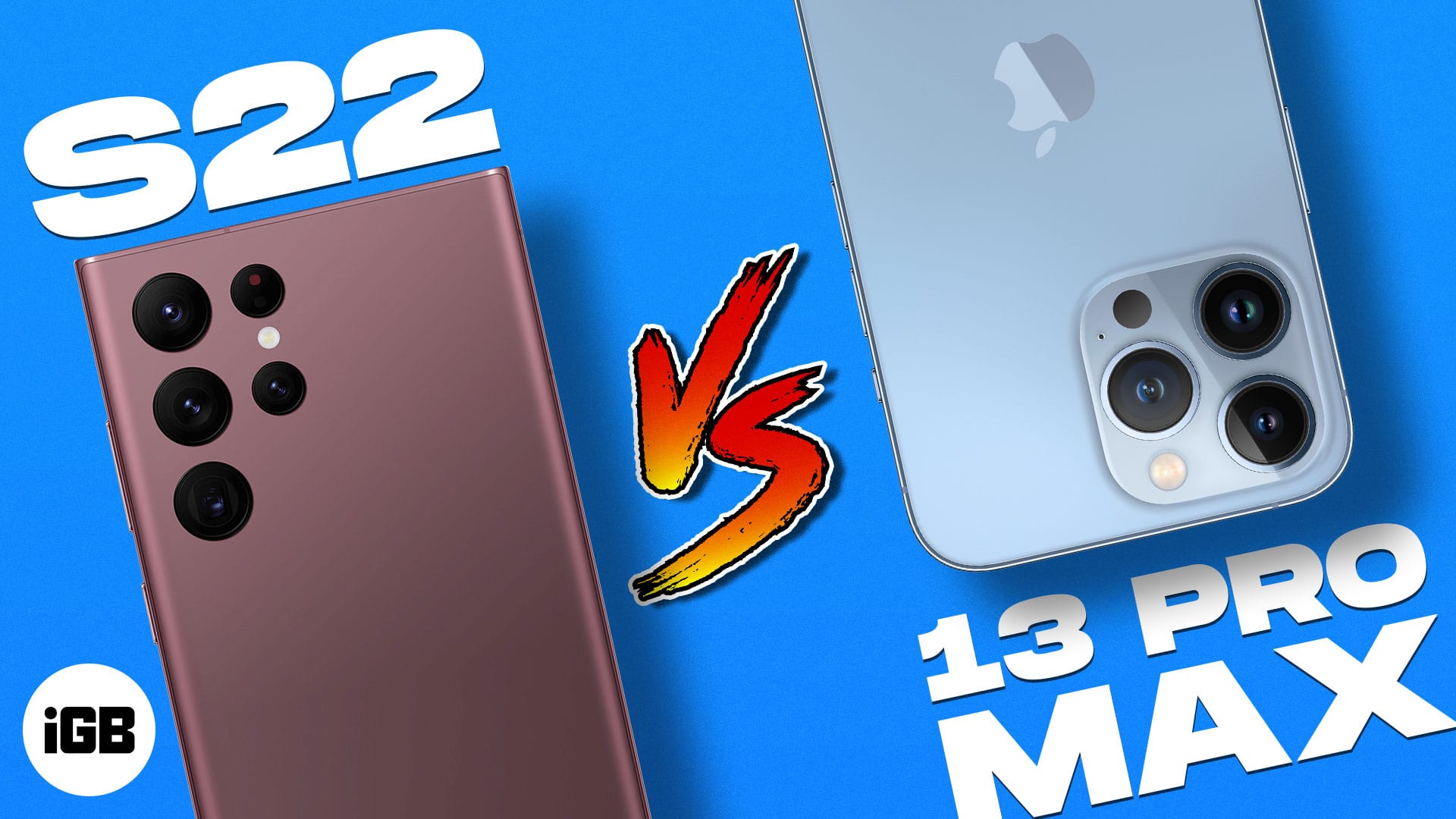
Samsung Galaxy S22 Ultra not only resembles the characteristics of the Note series but also provides the same utility, making it the archnemesis of the iPhone 13 Pro Max. But is it? This article will compare both devices in detail. If you can’t decide which of these devices to go with, I’ll try to help you make a better decision. Read on!
Design and display
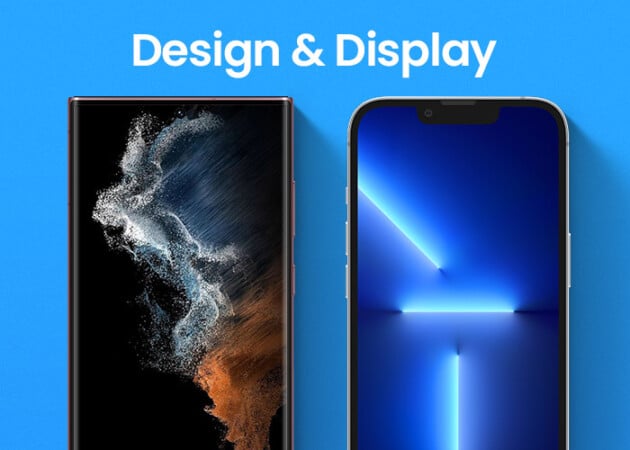
Beauty lies in the beholders’ eyes, and thus, the design of a device is and always will be subjective. However, certain aspects of the smartphone’s design will help qualify a device to be better.
Both of these devices feature a Glass Sandwich design, with the iPhone 13 Pro Max sporting a stainless-steel frame and the Samsung Galaxy S22 Ultra featuring an aluminum frame. But there’s more than what meets the eyes. Let’s talk in detail!
Display and ergonomics
The first thing you look at on a smartphone is its screen. The screen facilitates most of the activities on a smartphone, if not all. So, it is one of the most important aspects to consider while buying a device. Here’s an overview:
| Galaxy S22 Ultra | iPhone 13 Pro Max | |
| Dimensions (inch) | 6.43 x 3.07 x 0.35 | 6.33 x 3.07 x 0.3 |
| Screen size (inch) | 6.8 | 6.7 |
| Weight (gram) | 227 | 240 |
| Display | Dynamic AMOLED 2X | Super Retina XDR |
Now, let’s understand things a little better.
iPhone 13 Pro Max display
iPhone 13 Pro Max boasts a 6.7-inch Super Retina XDR display with ProMotion, a screen resolution of 2778 x 1284p, and 548-pixel density. This display can go as low as 10Hz because of its LTPO panel. This helps maintain the battery life of the device. In simple words, it is an OLED panel with an adaptive refresh rate.
The display’s peak brightness is 1,000 nits, bright enough in outdoor conditions. Brightness can also reach up to 1,200 nits when consuming or recording HDR content.
Further, we can’t overlook one important factor: the iPhone has a notch that houses the sensors needed for Face ID and the selfie camera. While the notch is utilitarian, and you will get used to it in a few days, it makes a significant difference when looking at what the competition offers.
Samsung Galaxy S22 Ultra display
Samsung Galaxy S22 Ultra has a 6.8-inch QHD+ Dynamic AMOLED 2X Display. As it’s only been a few days since the device launched, we are unaware of the screen resolution or pixel density. However, considering its QHD+ OLED panel, the screen resolution will be higher than 2560 x 1440p.
Further, Samsung uses a second-generation LTPO panel with an adaptive refresh rate that ranges from 1Hz to 120Hz.
Also, this panel can reach a peak brightness of 1,750 nits. Again, this might only be for HDR content and when the display is under direct sunlight. The display has curved edges, making the device look premium (IMO), providing utility and a better in-hand feel.
Ergonomics
The iPhone 13 Pro Max has a boxy design with flat edges and weighs 238 grams, whereas the Galaxy S22 Ultra has curved edges and weighs 229 grams. The difference is significant.
Besides, the Samsung S22 Ultra will also feel a tad bit lighter. The dimensions of the device are also quite similar, and so, before buying, I recommend you go into the store and check for yourself which one feels better in your hand.
Ports
| Galaxy S22 Ultra | iPhone 13 Pro Max | |
| Port | USB Type-C Gen 3.2 | Lightning port |
| Extra | S-Pen |
The iPhone 13 Pro Max features a lightning port, and while Apple has eliminated this port in most of their recent devices, it is reluctant to do so with the iPhone.
Why does this matter so much? Today, most devices come with the USB Type-C port, allowing you to use one cable to charge all your devices. The lightning port also has lower data transfer speeds than the USB Type-C port.
On the other hand, Galaxy S22 Ultra sports a USB Type-C Gen 3.2. It has faster data transfer speeds and provides consistency across the board. Another unique selling point of the S22 Ultra is the S-Pen. The device houses the S-pen within itself.
However, what I found most striking was that Samsung says they’ve eliminated the 3.5mm audio jack for providing a larger battery, but they can still house a stylus in a device. Well, let’s not get all negative, as the S-Pen has always had a target audience. Moreover, the S-Pen’s latency on the S22 Ultra is as low as 3ms.
Protection
| Galaxy S22 Ultra | iPhone 13 Pro Max | |
| IP rating | IP68 certified | IP68 certified |
| Display | Gorilla Glass Victus+ | Gorilla Glass |
Apple calls the display protection technology used in the iPhone 13 Pro Max as Ceramic Shield. While it does not break quite easily, it tends to pick up a lot of scratches. Also, both the glass panels on the front and back are Gorilla Glass panels. It also is IP68 dust and water resistance certified.
Samsung Galaxy S22 Ultra has Gorilla Glass Victus+ on the front and back. It is the latest and the greatest of what is available on the market right now. The S22 Ultra also features IP68 dust and water resistance certification. However, one rule to abide by always is: glass is glass and glass breaks.
Winner in design and display: Galaxy S22 Ultra
Camera
Smartphones have made capturing memories not only convenient but also quick. Most of the cameras in smartphones, around $500, will do the job well, and if you are spending upwards of $1,000, you’d definitely want the best. Here’s what each device has to offer:
| Galaxy S22 Ultra | iPhone 13 Pro Max | |
| Main camera | 108MP, 23mm, f/1.8, OIS 1/1.33″ sensor | 12MP, 26mm, f/1.5, Sensor-shift stabilization 1/1.65″ sensor |
| Ultra-wide camera | 12MP, 13mm, f/2.2 1/2.55″ sensor | 12MP, 0.5X (13mm), f/1.8 1/3.4″ sensor |
| Telephoto camera | 10MP, 3X zoom, f/2.4, OIS 1/3.52″ sensor | 12MP, 3X zoom (77mm), f/2.8, OIS |
| Additional camera | 10MP, 10X periscope zoom, f/4.9, OIS 1/3.52″ sensor | |
| Front camera | 40MP | 12MP |
Rear camera sensors and zooming capabilities
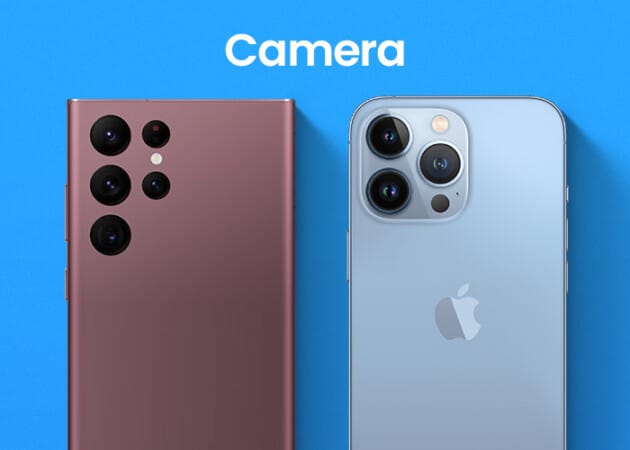
iPhone 13 Pro Max has a triple-camera setup at the rear and a Lidar sensor used for depth perception and 3D mapping. The primary camera is a 12MP sensor, the ultrawide camera is also a 12MP sensor with a 120-degree Field of view. Finally, the telephoto camera is also a 12MP sensor.
Further, iPhone 13 Pro Max can support 3X optical zoom. Optical zoom refers to the ability of zooming in while clicking a picture without deteriorating image quality. Digital zoom capabilities of the iPhone 13 Pro Max are up to 15X, and the image quality deteriorates with digital zoom; the iPhone retains decent details.
On the other hand, Galaxy S22 Ultra has a quad-camera setup at the rear. The primary sensor is a 108MP. Yes, the MegaPixel count is much higher, and while the normal images are clicked at 12MP due to pixel binning when shooting in RAW, the 108MP will help retain the details.
Besides, the Ultrawide camera is a 12MP sensor with a 120-degree field of view. Galaxy S22 Ultra has two 10MP telephoto lenses. While one of these supports 3X optical zoom and 34-degree FOV, the other sensor supports 10X optical zoom and 11-degree field of view.
In terms of zooming capabilities, the S22 Ultra blows the iPhone 13 Pro Max out of the water. Also, S22 Ultra has more saturated colors, and you can achieve the same on the iPhone by using the color profiles features.
Low light
The low light capabilities of both these devices are good enough for what their purpose is. However, there is no definitive winner. Both of these cameras perform equally well in terms of details, but the S22 Ultra captures slightly higher details under low lighting conditions.
Video: 8K vs. ProRes
iPhone has always dominated the video department, and it continues to do so. While the S22 Ultra can shoot videos in 8K 24FPS, the iPhone 13 Pro Max comes with ProRes video.
Both devices support Portrait mode in videos too. However, you can change the amount of bokeh after or before shooting in the iPhone 13 Pro Max; the same is not possible on the S22 Ultra. And iPhone nails the video department.
Don’t get me wrong, the video recording capabilities are good on the S22 Ultra too, but the iPhone wins by a good margin.
Which offers a better camera?
You cannot go wrong with any of these devices. However, if you click more pictures than videos, the S22 Ultra is a better choice. But if you love shooting videos alongside pictures, the iPhone 13 Pro Max is a clear choice.
Also, the S22 Ultra is not officially available yet to the public, and we expect there to be improvements in the camera department with updates. So, stay tuned for more accurate results!
Software
iPhone 13 Pro Max runs on iOS, and the S22 Ultra runs on One UI 4 based on Android 12.
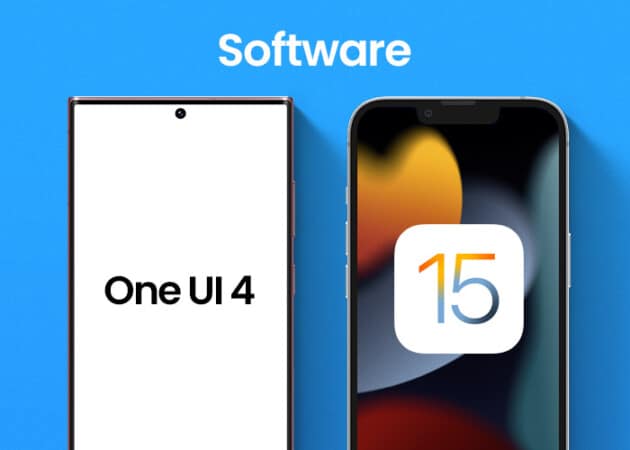
Updates
iPhone has had good software support for a long time now, and there are instances where iPhones get iOS updates even after six years of launch, sometimes even more.
However, it has been the complete opposite on the Android side of things, with the only exception being Pixel devices, receiving 3-4 years of software updates.
But Samsung has turned the tale this year. As against the last year when it provided 3+1 software and security updates, this year it announced that Samsung devices would receive 4+1 years of software and security updates.
While Samsung has shown great progress, we can be sure that the iPhone 13 Pro Max will receive longer software support than the S22 Ultra, given Apple’s track record.
Optimization and customizability
The iPhone 13 Pro Max is known for its battery life, made possible due to its A15 Bionic and iOS compatibility. When a manufacturer designs both the hardware and software, they will have more control over what they do and how they do it.
If you own other Apple devices, the convenience is unmatched. The overall software integration with hardware products is better on the Apple side of things than Samsung.
However, customizability is one factor where there is no argument that Android is better. iPhones have recently started being more customizable with the introduction of widgets and workarounds to change app icons.
Yes, the control you get with iPhone is unmatched. Still, it does not come close to the Android side of things, especially Android 12.
Which software should you choose?
While making your pick based on software, you have to look a little broader. If your workflow involves Apple products, the convenience brought by the Apple ecosystem is too good to be left out. But if you want the utility and customizability, S22 Ultra is a device you would not regret.
Battery and charging
| Galaxy S22 Ultra | iPhone 13 Pro Max | |
| Battery capacity | 5,000mAh | 4,352mAh |
| Charging speed | 45 Watts | 25 Watts |
iPhone 13 Pro Max still the battery king?
Samsung Galaxy S22 Ultra houses a 5,000mAh battery, and the iPhone 13 Pro Max houses a 4,352mAh battery (Apple doesn’t reveal battery capacity, so these are approximate values).
Several reviewers have praised the iPhone 13 Pro Max for providing an excellent battery backup. On the other hand, S22 Ultra has not been released to the public yet, so it is difficult to say if it will win against the iPhone 13 Pro Max. Most probably not, as already seen in many reviews along with the below one by Mr. Whose the Boss.
Primarily because the A15 Bionic SoC has been tuned well to consume less power and deliver more performance, and the same has not yet been achieved on any Android flagship.
Charging speed and wireless charging
The iPhone 13 Pro Max supports wired charging speeds of up to 27W. Thanks to MagSafe Wireless charging, it can charge up to 15W, and with Qi wireless charging, it supports 7.5W. There is no official statement about the charging speeds of the iPhone, but Apple advertises 0-50% in under 30 mins with the 20W charger or above.
Samsung Galaxy S22 Ultra supports wired charging speeds of up to 45W. Wireless charging is similarly capped at 15W. The charging speeds are faster on the S22 Ultra, but it also features reverse wireless charging, useful in emergencies.
While the S22 Ultra has more features and faster charging, the iPhone has better battery life. Considering the iPhone can charge from 0-50% around 30 minutes, I’d pick the iPhone if the battery were my priority.
Winner in battery: iPhone 13 Pro Max
Processor and performance
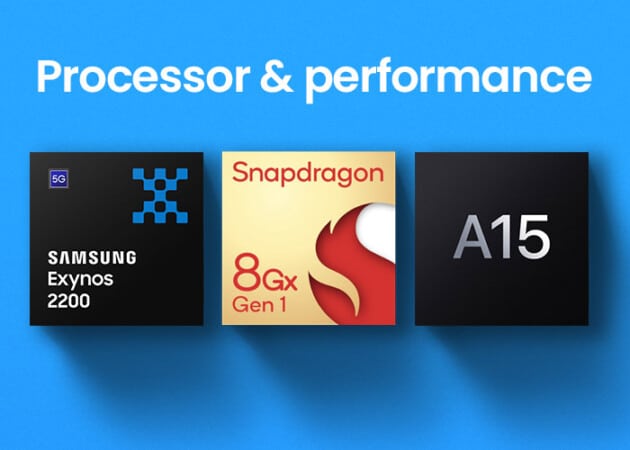
Apple has designed its own SoC’s for a good time now, and they are powerful and power-efficient. We have also seen this with Apple’s M1 SoCs. The iPhone 13 Pro Max is powered by the best and most powerful SoC designed by Apple for a smartphone. As mentioned earlier, it is A15 Bionic, based on a 5nm process.
Whereas Samsung uses different SoCs in different regions. Galaxy S22 Ultra is powered by Snapdragon 8 Gen 1. It is based on a 4nm process and still isn’t as powerful as the A15 bionic launched last year.
However, there won’t be any noticeable difference in day-to-day usage in both these phones, but when we look at the benchmarks, A15 bionic beats Snapdragon 8 Gen 1.
Winner in processor and performance: iPhone 13 Pro Max
Price
| Storage | Galaxy S22 Ultra | iPhone 13 Pro Max |
| 128GB | $1,199 | $1,099 |
| 256GB | $1,199 | $1,199 |
| 512GB | $1,299 | $1,399 |
| 1TB | $1,599 | $1,599 |
S22 Ultra vs. iPhone 13 Pro Max: Which is better?
Well, the answer you were looking for all along is not that simple.
Design is subjective, and I’m going to leave it up to you to decide. If I wanted a device solely based on the design, the S22 Ultra is a clear choice.
In the performance department, both of these devices will perform equally well. The iPhone 13 Pro Max will have better thermals under heavy tasks as the A15 Bionic can deliver more performance while consuming less power than Snapdragon 8 Gen 1.
Cameras again are equally good. One simple rule, if photos are your priority, pick the S22 Ultra. But in terms of video, there’s no beating the iPhone 13 Pro Max. The iPhone 13 Pro Max clicks good pictures, too; it’s just that zooming capabilities and low light performance is better on the S22 Ultra.
Other features like charging speeds, ports, etc., are something the S22 Ultra wins at. So, choose a device depending on what your needs are. And I will repeat myself if you are already in the Apple ecosystem, iPhone 13 Pro Max should be your singular go-to device for its unmatched convenience.
Which device would you pick? Share in the comments below.
Read more:

